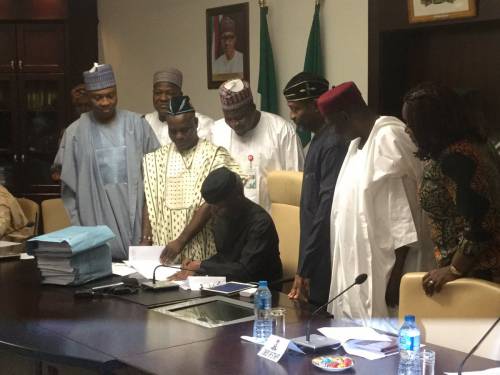Breaking News
Finally, Osinbajo Signs Budget As Absentee President Buhari Fails To Show Up, Acknowledges Disagreement

Acting President Yemi Osinbajo has said the delay in the signing of the 2017 budget was due to disagreements on changes made to budget proposals by the National Assembly.
He said this in a speech he gave just after signing the 2017 Appropriation Bill to law on Monday.
The statement read, “A few minutes ago, I signed the 2017 Appropriations Bill into law. This is an important milestone in our economic recovery and Growth plan laid in April by President Muhammadu Buhari.
I would like to express my appreciation to the Senate President, the Speaker of the House of Representatives, as well as the entire leadership and members of the National Assembly for completing work on the 2017 Appropriation Bill. And I will return to this point presently.
The process of preparing and processing this Bill was much smoother than the 2016 Appropriations Bill. On the executive side, there were no allegations of errors, or mistakes, and there was a significant improvement in the quality of the preparation, as well as the presentation.
I wish to commend the Ministry of Budget and Planning for such a remarkable improvement over a single budget cycle.
On the side of the National Assembly, I wish to commend the collaborative spirit of the engagements our MDAs had with their various committees, and with the leadership, during the budget defence sessions. There were far fewer reported cases of acrimony, or hostile wrangling this year, than in the past.
From the reports we received, the sessions were generally conducted in a friendly atmosphere. There is no doubt that our democracy is maturing.
However, the final presentation and the signing of the budget has been considerably delayed. This was largely due to disagreements we had about the changes introduced to our 2017 Budget proposals by the National Assembly.
The executive took the view that the changes fundamentally affected some of our priority programmes and would make implementation extremely difficult and in some cases impossible.
I must say that the entire leadership of the National Assembly led by the Senate President and the Speaker, adopted a commendably patriotic and statesmanlike approach to our engagements on resolving these critical issues.
In sum, the engagements yielded acceptable results . The most important being that the leadership of the National Assembly has given us a commitment that the National Assembly will re-instate the budgetary allocations for all the important executive projects, such as the railway standard gauge projects, the Mambilla Power Project, the Second Niger Bridge, the Lagos – Ibadan Expressway etc. which they had reduced to fund some of the new projects they introduced.
This re-instatement will be by way of an application for virement by the Executive which they have agreed will be expeditiously considered and approved by the National Assembly.
It is as a result of that understanding and the outcome of our detailed engagements that we feel able to sign the 2017 Appropriations Bill into law today.
I am also pleased to mention that, in our discussions with the leadership of the National Assembly, we have jointly resolved to return to a predictable January to December fiscal year.
It is a particularly important development because this accords with the financial year of most private sector companies, underscoring the crucial relationship between government and the private sector.
Therefore, on the understanding that we will be submitting the 2018 Budget to the National Assembly by October 2017, the leadership of the National Assembly has committed to working towards the passage of the 2018 Budget into law before the end of 2017. I must, once more, express my appreciation to the leadership of the National Assembly, for the collaborative spirit in which these discussions were conducted.
The 2017 Budget, which I have signed into law today, is christened “Budget of Economic Recovery and Growth” and reflects our commitment to ensure strong linkage between the medium-term Economic Recovery and Growth Plan (ERGP) recently launched by His Excellency, President Muhammadu Buhari and the annual budgets.
It is designed to bring the Nigerian economy out of recession unto a path of sustainable and inclusive growth. The budget has a revenue projection of N5.08 trillion and an aggregate expenditure of N7.44 trillion. The projected fiscal deficit of N2.36 trillion is to be financed largely by borrowing.
Let me assure those who have expressed concern about the growing public debt that we are taking several actions to grow government revenues as well as plug revenue leakages. This is because, notwithstanding the fact that our borrowings are still within sustainability limits, we are determined, in the medium term, to reduce our reliance on borrowings to finance our expenditures.






